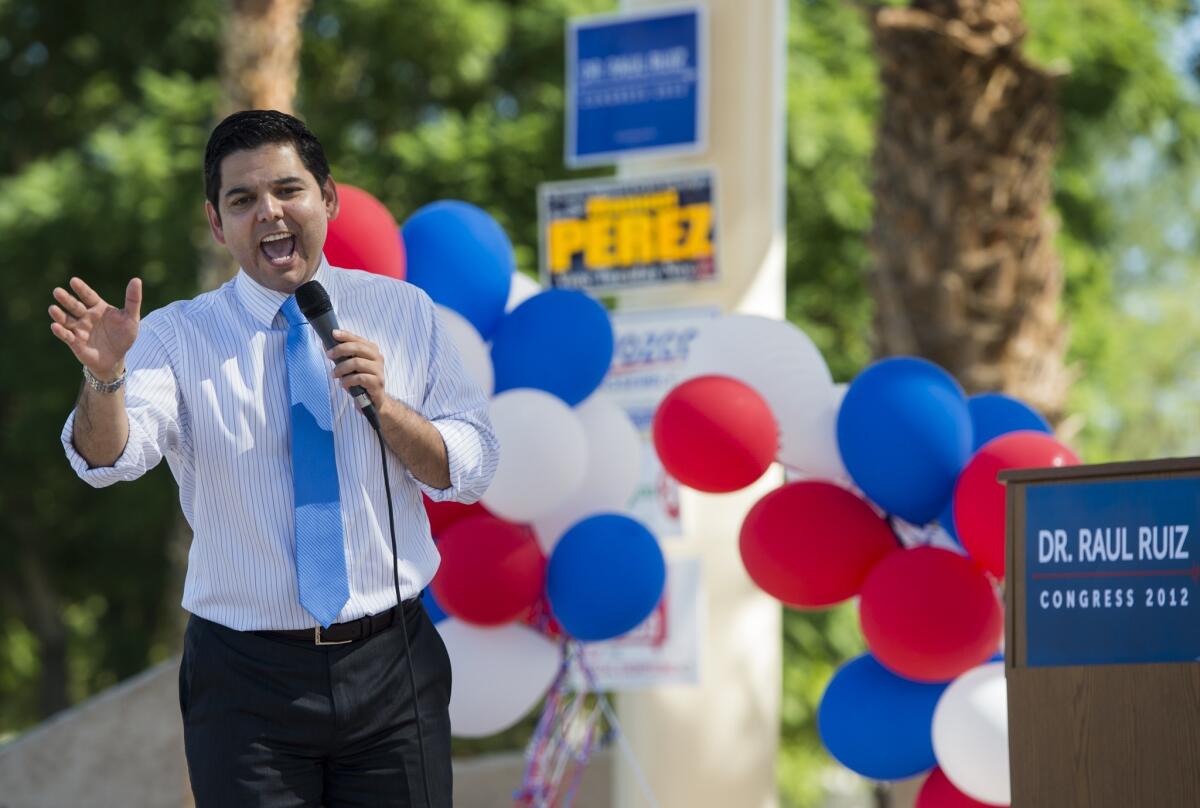A far from typical orchestra offers music for China’s masses
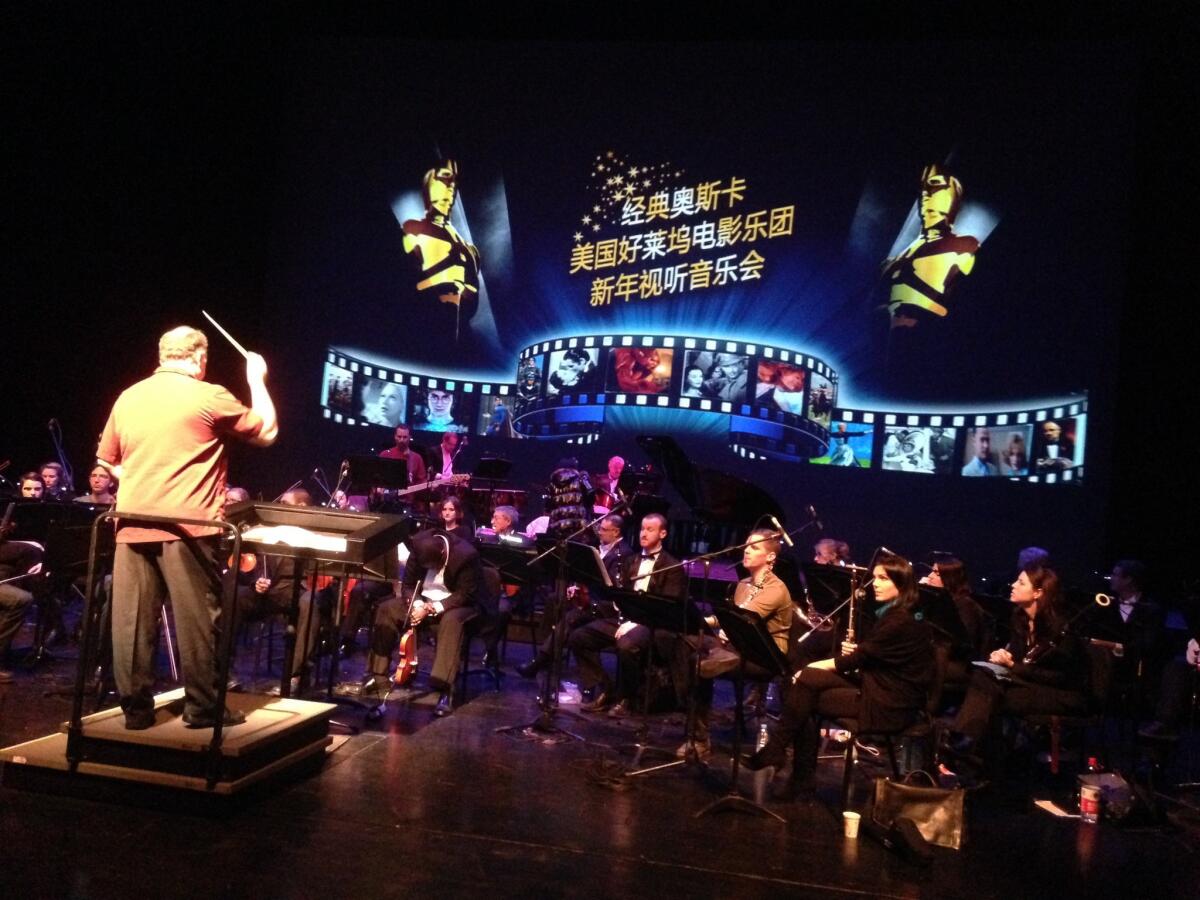
The American Hollywood Film Orchestra, an ensemble definitely not from Hollywood that travels without instruments, rolls with the punches on its tours.

Two hours before showtime at Beijing's prestigious National Center for the Performing Arts, China's equivalent of the Met, performers with the American Hollywood Film Orchestra were having a vaudevillian moment.
It was the latest stop on a blitzkrieg winter tour of China for a somewhat motley but certainly merry group of American minstrels definitely not from Hollywood.
They schlep by bus, train and plane to more than a dozen cities from late December to mid-January, offering up crowd-pleasing medleys from movies such as "Titanic," "Dances With Wolves," "The Incredibles" and "The Godfather." To save on travel expenses, the group doesn't lug around large instruments such as drums, upright basses or even cellos; local promoters in each town provide them.
On this Saturday evening in Beijing, two cellists opened the cases of the loaner instruments and found that the bridge on one had come completely off. Nearby, percussionist Chris Nolin briefly had steam coming out of his ears.
"Nicest hall in China and they give me the crappiest drum kit!" he exclaimed, pointing at the pitted and sagging drum heads. Stagehands with walkie-talkies, an interpreter and the local promoter buzzed around the stage, trying to figure out what to do.
But as they say in Hollywood, the show must go on, and so it did. (Nolin got his new drum heads 20 minutes before the curtain went up for the show, called "Classic Oscar: The American Hollywood Film Orchestra New Year's Audio-Visual Concert.")
At 7:30 p.m., conductor Jason Altieri took to the podium, raised his baton and launched the group into Berlioz's "Rakoczi March." Its ostensible Oscar connection? Well, there was none, but the song was included in the 1966 French film "La Grande Vadrouille," which, judging from the accompanying clips on a giant screen at the rear of the stage, was a slapstick comedy with lots of Nazis.
The orchestra's grueling schedule — 5:30 a.m. wake-ups, 11 p.m. dinners, with travel, rehearsal and performances in between — attests to the popularity of Hollywood fare in China as well as the seemingly insatiable demand for Western orchestral music as the country invests heavily in new concert venues and classical music education.
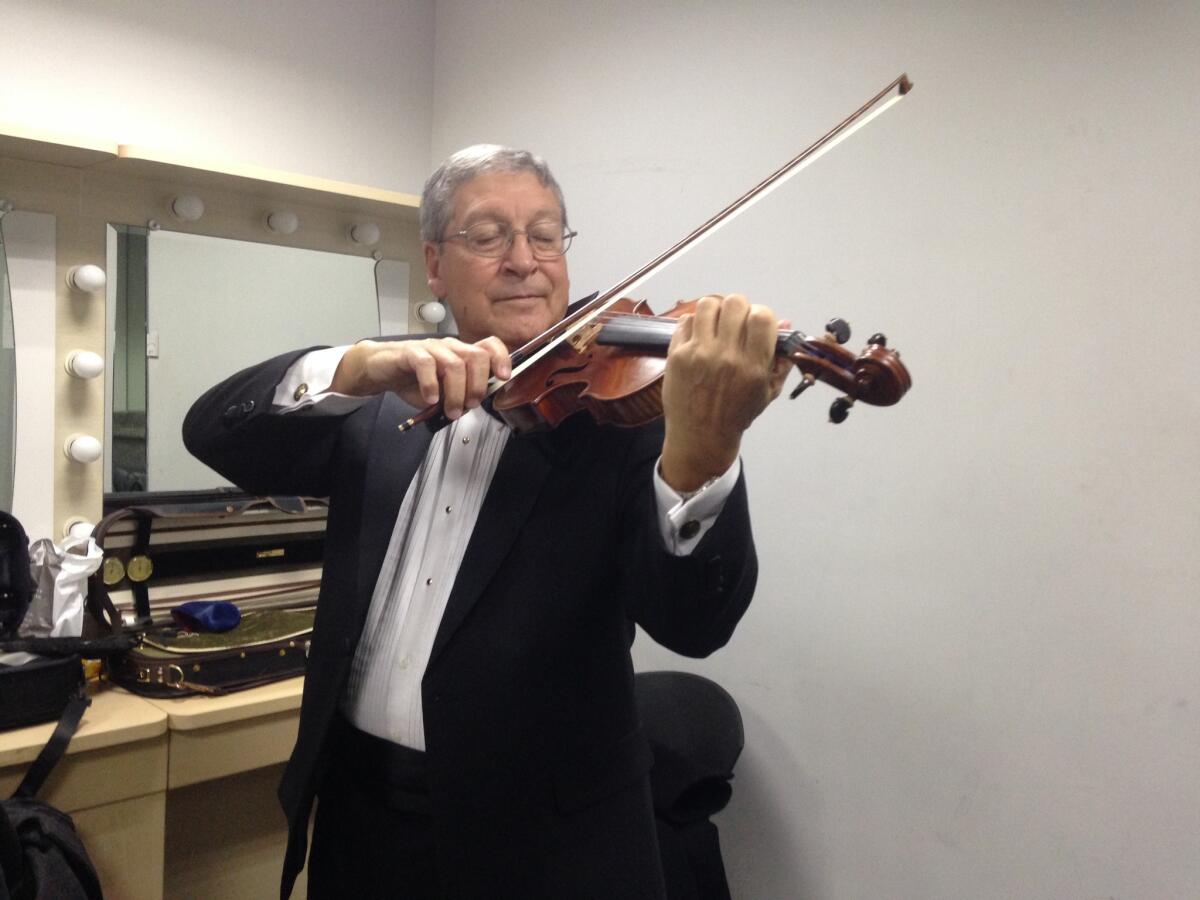
Jack Cobos, a violinist from Georgia, is on his second tour with the group. He's turning 71 during this trip and previously played with the Chattanooga Symphony. More photos
In just the last few months, the Philadelphia Orchestra, the San Diego Symphony, the BBC Concert Orchestra, Canada's National Arts Center Orchestra and even Pierce College's L.A. Symphonic Winds have staged China tours.
Also known as the Hollywood Concert Orchestra and the Hollywood Festival Orchestra, the movie-themed ensemble has been making the rounds in China for several years.
The group of about three dozen performers is assembled by a Kentucky-based producer, John Giattino; the musicians are recruited mainly from Midwestern and Southeastern states such as Ohio, Georgia and Florida, and they change each year. (Trumpeter Stephen Charpie of Buena Park is the lone Californian in the 2013-14 lineup. "The group's name … well, it's representative of what we're playing, but I'm the only one from L.A.," Charpie, who recently retired from the Long Beach Symphony, said with a laugh.)
Some performers are recent college grads, others are senior citizens like Jack Cobos, a retired carpet salesman and former violinist with the Chattanooga Symphony who's turning 71 during this tour. Though they're hardly celebrities, the musicians say that in smaller cities, they've been swarmed by crowds eager to take dozens of pictures after their shows.
When we got there to rehearse the day before, they were still building the bathrooms."— Jason Heidelberg, cellist
"I'm signing a lot of autographs," said Altieri, the assistant conductor of the Reno Philharmonic who is serving as maestro for the third time this tour. "It's kind of like that line from Mel Brooks' 'To Be or Not to Be': He's world famous in Poland."
The fast-and-loose atmosphere surrounding the orchestra's tour reflects the still-Wild West-like nature of performing arts booking, touring and promotion here. (A representative of the National Center for the Performing Arts, Wu Zhiwei, said the orchestra was signed up at the last minute to fill a hole in the schedule.)
Percussionist Caleb Herron of Atlanta arrived at one venue to find he was getting only one ancient timpani instead of the four required to perform his part. "I just had to try to play as many notes as possible," he said. "We just have to do our best, and have fun."
Sometimes, the concert halls are freezing cold or still under construction. Last year, the group inaugurated a new building in the eastern resort of Haiyang.
"When we got there to rehearse the day before, they were still building the bathrooms," said Jason Heidelberg, a cellist from Cleveland. "On the day of the show, the bathrooms were finished, but the floor was still not done — they just put red carpet over it."
John Bryant, a trumpeter who has toured with the group twice, said that in 2009 the group's plane was grounded by a snowstorm in Shenyang; the musicians had to resort to a standing-room-only train and made it to their next concert, in Xian, 90 minutes late. "Playing after like 18 hours of travel was crazy. We didn't even have time to change into our tuxes; we just went straight to the concert in our traveling clothes."
At another venue, Bryant said, he was stunned to find the room filled with cigarette smoke. "I'm a trumpet player and when you're trying to play and the room is full of smoke, well, it's a bit tough," he said.
Some audience members appear to be attending out of curiosity, while others are die-hard Hollywood film fans. At the Beijing show, college student Cecilia Yu, who studied violin for several years, said she was particularly looking forward to the segments from "Lord of the Rings," "Phantom of the Opera," and "Harry Potter."
"It's a good chance to hear this Hollywood orchestra," she said (though after the show ended, she quibbled that the "Phantom" medley took the songs out of order from the film).
As the group ran through its set, there were other, more glaring curiosities. When a lyrical John Williams piece from "Jurassic Park" was performed, the montage incongruously featured pterodactyls and velociraptors chasing, stomping and mauling the dinosaur park visitors.
In an effort to connect with the local crowds, the group performed selections from "Crouching Tiger, Hidden Dragon." The performers also surprised the audience with a piece from the 1961 Chinese film "The Red Detachment of Women," probably the first time that song has been on the same program with the "Mission: Impossible" theme and the alien style jazz of "Cantina Band" from "Star Wars."
Tickets for the group's shows aren't cheap, ranging from about $30 to $300. One former player said he was paid $2,600 to $3,000 for his three-week tours.
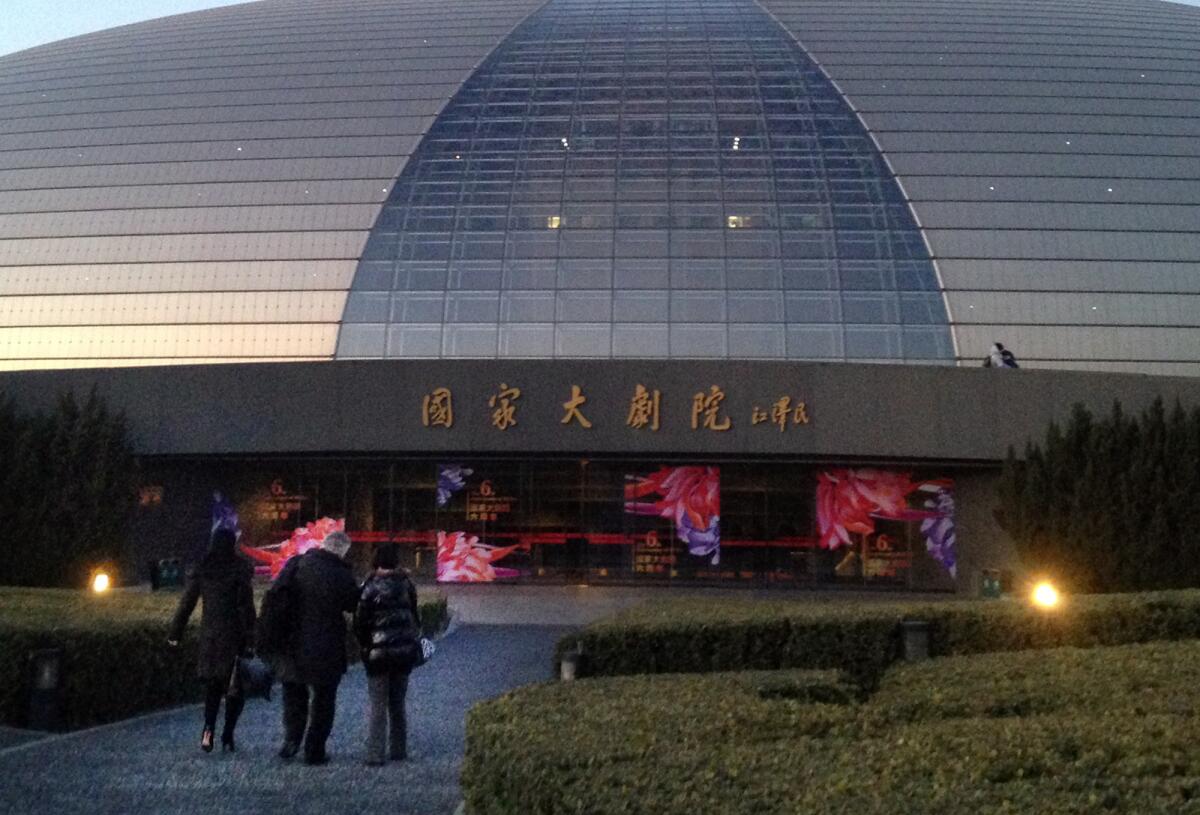
The National Center for the Performing Arts in Beijing, where the American Hollywood Film Orchestra performed, is China's equivalent of the Met. More photos
Most of the performers, though, say they're touring not so much for the money as the opportunity to see a bit of China, enjoy the camaraderie of their fellow musicians and connect with audiences across a linguistic and cultural divide.
Altieri recalled that in Ningbo, the group stumbled across a music school where an old man was teaching the erhu, a traditional Chinese two-stringed instrument, to youngsters. The Americans watched for half an hour, and the kids staged an impromptu concert. Later, the Americans found a group of people performing karaoke in a park.
"One of our players sang 'My Heart Will Go On' with them, and that night, all the karaoke people ended up buying tickets to our show. They even came backstage and gave us flowers," he said. "That's what I love about doing this: making music and sharing it, having that connection with other people that goes beyond language."
Nolin, a veteran of multiple tours, agreed.
"Traveling orchestras are rare dinosaurs indeed," he said. "I like the fact that I'm doing something that has been done since the Middle Ages, and probably before; traveling from town to town, bringing music to the masses, and in this case, from across the world. It's fun and ennobling, in spite of the hardships."
Nicole Liu of The Times' Beijing bureau contributed to this report.
Follow Julie Makinen (@JulieMakLAT) on Twitter
Follow @latgreatreads on Twitter
More great reads
Myanmar's historic buildings imperiled by modern world
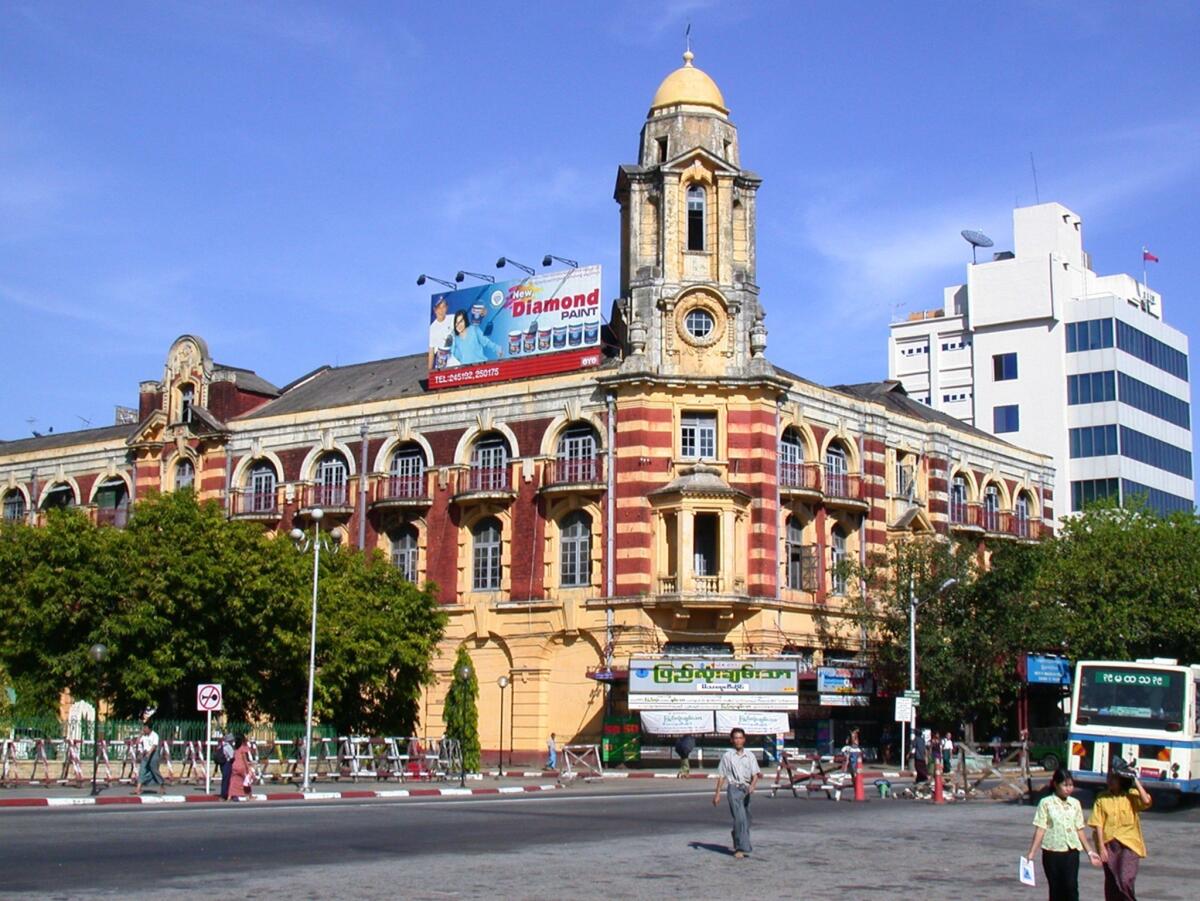
There is a place for high-rises and there is a place to not have them."
Start your day right
Sign up for Essential California for news, features and recommendations from the L.A. Times and beyond in your inbox six days a week.
You may occasionally receive promotional content from the Los Angeles Times.
